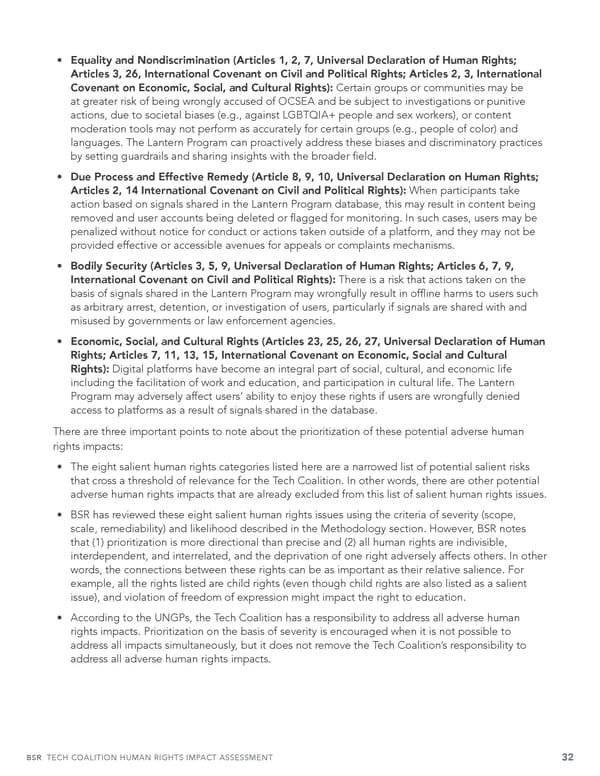• Equality and Nondiscrimination (Articles 1, 2, 7, Universal Declaration of Human Rights; Articles 3, 26, International Covenant on Civil and Political Rights; Articles 2, 3, International Covenant on Economic, Social, and Cultural Rights): Certain groups or communities may be at greater risk of being wrongly accused of OCSEA and be subject to investigations or punitive actions, due to societal biases (e.g., against LGBTQIA+ people and sex workers), or content moderation tools may not perform as accurately for certain groups (e.g., people of color) and languages. The Lantern Program can proactively address these biases and discriminatory practices by setting guardrails and sharing insights with the broader 昀椀eld. • Due Process and Effective Remedy (Article 8, 9, 10, Universal Declaration on Human Rights; Articles 2, 14 International Covenant on Civil and Political Rights): When participants take action based on signals shared in the Lantern Program database, this may result in content being removed and user accounts being deleted or 昀氀agged for monitoring. In such cases, users may be penalized without notice for conduct or actions taken outside of a platform, and they may not be provided effective or accessible avenues for appeals or complaints mechanisms. • Bodily Security (Articles 3, 5, 9, Universal Declaration of Human Rights; Articles 6, 7, 9, International Covenant on Civil and Political Rights): There is a risk that actions taken on the basis of signals shared in the Lantern Program may wrongfully result in of昀氀ine harms to users such as arbitrary arrest, detention, or investigation of users, particularly if signals are shared with and misused by governments or law enforcement agencies. • Economic, Social, and Cultural Rights (Articles 23, 25, 26, 27, Universal Declaration of Human Rights; Articles 7, 11, 13, 15, International Covenant on Economic, Social and Cultural Rights): Digital platforms have become an integral part of social, cultural, and economic life including the facilitation of work and education, and participation in cultural life. The Lantern Program may adversely affect users’ ability to enjoy these rights if users are wrongfully denied access to platforms as a result of signals shared in the database. There are three important points to note about the prioritization of these potential adverse human rights impacts: • The eight salient human rights categories listed here are a narrowed list of potential salient risks that cross a threshold of relevance for the Tech Coalition. In other words, there are other potential adverse human rights impacts that are already excluded from this list of salient human rights issues. • BSR has reviewed these eight salient human rights issues using the criteria of severity (scope, scale, remediability) and likelihood described in the Methodology section. However, BSR notes that (1) prioritization is more directional than precise and (2) all human rights are indivisible, interdependent, and interrelated, and the deprivation of one right adversely affects others. In other words, the connections between these rights can be as important as their relative salience. For example, all the rights listed are child rights (even though child rights are also listed as a salient issue), and violation of freedom of expression might impact the right to education. • According to the UNGPs, the Tech Coalition has a responsibility to address all adverse human rights impacts. Prioritization on the basis of severity is encouraged when it is not possible to address all impacts simultaneously, but it does not remove the Tech Coalition’s responsibility to address all adverse human rights impacts. BSR TECH COALITION HUMAN RIGHTS IMPACT ASSESSMENT 32
 Tech Coalition Human Rights Impact Assessment of the Lantern Program Page 31 Page 33
Tech Coalition Human Rights Impact Assessment of the Lantern Program Page 31 Page 33